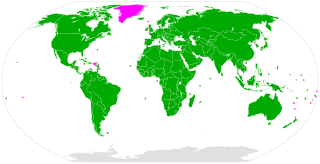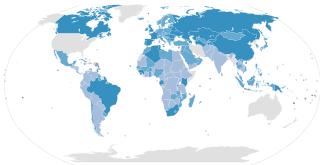
Child labour or child labor refers to the exploitation of children through any form of work that deprives children of their childhood, interferes with their ability to attend regular school, and is mentally, physically, socially and morally harmful. Such exploitation is prohibited by legislation worldwide, although these laws do not consider all work by children as child labour; exceptions include work by child artists, family duties, supervised training, and some forms of child work practiced by Amish children, as well as by indigenous children in the Americas.

Child prostitution is prostitution involving a child, and it is a form of commercial sexual exploitation of children. The term normally refers to prostitution of a minor, or person under the legal age of consent. In most jurisdictions, child prostitution is illegal as part of general prohibition on prostitution.
The Harkin–Engel Protocol, sometimes referred to as the Cocoa Protocol, is an international agreement aimed at ending the worst forms of child labor and forced labor in the production of cocoa, the main ingredient in chocolate. The protocol was negotiated by U.S. Senator Tom Harkin and U.S. Representative Eliot Engel in response to a documentary and multiple articles in 2000 and 2001 reporting widespread child slavery and child trafficking in the production of cocoa. The protocol was signed in September 2001. Joint Statements in 2001, 2005 and 2008 and a Joint Declaration in 2010 extended the commitment to address the problem.
The Child Labour Programme of Action is the national plan on elimination of child labour in South Africa. It was provisionally adopted by a large group of key stakeholders in September 2003. These stakeholders include key government departments, including those responsible for labour, education, provincial and local government, water service, justice, policing, prosecution, social development, and education. The lead department is the Department of Labour. It was previously known as the Child Labour Action Programme, but was renamed in February 2006 because of the negative connotation attached to the abbreviation CLAP.

The Convention concerning the Prohibition and Immediate Action for the Elimination of the Worst Forms of Child Labour, known in short as the Worst Forms of Child Labour Convention, was adopted by the International Labour Organization (ILO) in 1999 as ILO Convention No 182. It is one of eight ILO fundamental conventions.
The International Labour Organization Worst Forms of Child Labour Convention calls for time-bound programmes for the eradication of the worst forms of child labour. Countries ratifying this Convention must take immediate and effective measures to secure the prohibition and elimination of the worst forms of child labour (WFCL) as a matter of urgency.
The Worst Forms of Child Labour Recommendation was adopted by the International Labour Organization (ILO) in 1999 as ILO Recommendation No 190. The provisions of this Recommendation supplement those of the Worst Forms of Child Labour Convention and should be applied in conjunction with them. This article should be read together with that on the Convention.

Commercial sexual exploitation of children (CSEC) is a commercial transaction that involves the sexual exploitation of a child, or person under the age of consent. CSEC involves a range of abuses, including but not limited to: the prostitution of children, child pornography, stripping, erotic massage, phone sex lines, internet-based exploitation, and early forced marriage.
The Protocol to Prevent, Suppress and Punish Trafficking in Persons, Especially Women and Children is a protocol to the United Nations Convention against Transnational Organized Crime. It is one of the three Palermo protocols, the others being the Protocol against the Smuggling of Migrants by Land, Sea and Air and the Protocol against the Illicit Manufacturing of and Trafficking in Firearms.

The ILO Convention concerning Minimum Age for Admission to Employment C138, is a convention adopted in 1973 by the International Labour Organization. It requires ratifying states to pursue a national policy designed to ensure the effective abolition of child labour and to raise progressively the minimum age for admission to employment or work. Convention C138 replaces several similar ILO conventions in specific fields of labour.

Trafficking of children is a form of human trafficking and is defined by the United Nations as the "recruitment, transportation, transfer, harboring, and/or receipt" kidnapping of a child for the purpose of slavery, forced labor and exploitation. This definition is substantially wider than the same document's definition of "trafficking in persons". Children may also be trafficked for the purpose of adoption.

On Red Hand Day or the International Day against the Use of Child Soldiers, February 12 each year since 2002, pleas are made to political leaders and events are staged around the world to draw attention to child soldiers: children under the age of 18 who participate in military organizations of all kinds. The aim of Red Hand Day is to call for action to stop this practice, and for support for children affected by it.

Human trafficking is the trade of humans for the purpose of forced labour, sexual slavery, or commercial sexual exploitation for the trafficker or others. This may encompass providing a spouse in the context of forced marriage, or the extraction of organs or tissues, including for surrogacy and ova removal. Human trafficking can occur within a country or trans-nationally. Human trafficking is a crime against the person because of the violation of the victim's rights of movement through coercion and because of their commercial exploitation. Human trafficking is the trade in people, especially women and children, and does not necessarily involve the movement of the person from one place to another.

United Nations Security Council resolution 1261, adopted unanimously on 25 August 1999, in the first resolution to address the topic, the Council condemned the targeting of children in armed conflict including the recruitment and use of child soldiers.

United Nations Security Council resolution 1314 was adopted unanimously on 11 August 2000, after recalling Resolution 1261 (1999) on children and armed conflict and other resolutions including 1265 (1999), 1296 (2000) and 1306 (2000). The Council expressed concern at the impact of conflict upon children and the use of child soldiers, and expressed willingness to consider further measures under the United Nations Charter when dealing with situations of children in armed conflict.

United Nations Security Council resolution 1539, adopted unanimously on 22 April 2004, after recalling resolutions 1261 (1999), 1308 (2000), 1314 (2000), 1325 (2000), 1379 (2001) and 1460 (2003), the Council condemned the use of child soldiers and asked the Secretary-General to devise a monitoring mechanism.
Forced child labour has been reported to be widespread in the cotton industry in Uzbekistan. A 2007 BBC Newsnight report stated that this forced labour occurs for two and a half months each year, in a cotton industry controlled completely by the Uzbek state. Radio Free Europe has reported Uzbek human rights activists as stating that the forced labour of children is "deliberate state policy".
In keeping with the Paris Principles definition of a child soldier, the Roméo Dallaire Child Soldiers Initiative defines a child pirate' as any person below 18 years of age who is or who has been recruited or used by a pirate gang in any capacity, including children - boys and/or girls - used as gunmen in boarding parties, hostage guards, negotiators, ship captains, messengers, spies or for sexual purposes, whether at sea or on land. It does not only refer to a child who is taking or has taken a direct part in kinetic criminal operations.








